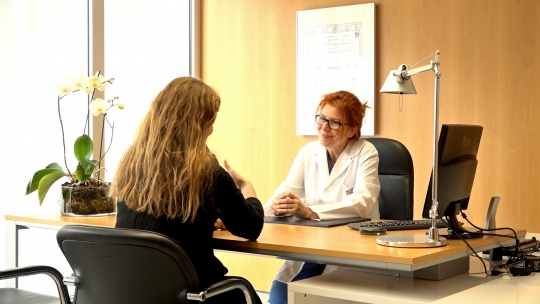
What tests do I need to have before egg donation treatment?
Egg donation has become an option for women who, for whatever reason, can no longer use their own ova. For example, due to poor ovarian reserve, poor oocyte quality and premature menopause.
The process is widely used in Spain. As well as exceeding organ donations and transplants in number, we also have the largest number of egg donors in Europe.
It is common knowledge that donors are subject to strict selection criteria and blood tests, medical tests and even genetic tests before they join the donor programme at our clinic. But does the recipient also have to have medical tests of any kind before treatment begins?
The tests performed on all women who are going to have egg donation treatment include:
- Blood group and Rh factor test. First of all, patients have a basic blood test to work out their blood group and Rh factor. The basic test includes a blood count, biochemical markers and coagulation and it allows us to determine what the status of the woman’s health is. The patient’s blood group and Rh factor are some of the parameters that are assessed in order to select the right donor.
- Gynaecological checkup. A comprehensive, recent gynaecological checkup including a cervical and vaginal smear test and a transvaginal ultrasound scan are necessary in order to rule out any pathologies that could affect the pregnancy.
- Serology test. In accordance with a Spanish Royal Decree and Law on Assisted Reproduction, blood serologic tests for Hepatitis B, Hepatitis C, the Human Immunodeficiency Virus (HIV), syphilis and rubella must be documented and reviewed. Women must have been assessed within the previous 12 months. A serologic test of this kind is common and it is a requirement.
- Thyroid assessment. Complementary tests should also include a thyroid hormone test that analyses TSH (thyroid-stimulating hormone) and anti-TPO antibodies (anti-thyroid peroxidase). It is important for the patient to have optimum thyroid hormone levels. There are two main symptoms depending on if the patient’s thyroid hormones are low (hypothyroidism) or high (hyperthyroidism). Anti-TPOS should be taken into account when assessing patients with subclinical hypothyroidism since these antibodies are specific to thyroid gland autoimmune diseases. In these cases, the immune system attacks the healthy cells in a person’s body.
- Glycosylated haemoglobin. A HbA1C test or glycosylated haemoglobin test is also performed. We can say that this examination gives a retrospective view of sugar levels in blood over the last 3 months.
Women who are 40 years old or older must have recently had a mammogram.
Women over 45 years of age will be asked to undergo additional tests such as an electrocardiogram. This test records the heart’s electrical activity in each heartbeat.These tests must be accompanied by a medical report. It must indicate if the woman is healthy enough to be able to go through a pregnancy and that the pregnancy without it entailing any added complications.
Once the necessary tests have been performed and documented, treatment can begin.
